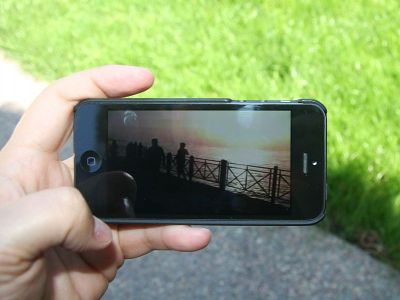Chen and Nizan Sagiv had the idea when they were at a Depeche Mode
concert in Tel Aviv five years ago. "While I was busy looking at the
show, Nizan was watching the crowds," explained Chen, SCENENET project
coordinator. "He could not help noticing the huge number of faint lights
from mobile phone screens. People were taking videos of the show. Nizan
thought that combining all the videos taken by individuals into a
synergetic, enhanced and possibly 3D video could be an interesting idea.
We discussed the concept for many months, but it looked too futuristic,
risky and complicated."
Israel–Europe collaboration
They went for advice from ISERD,
the Israel-Europe R&D directorate
, and contacted Prof. Peter Maass, of the University of Bremen in
Germany, and Prof. Pierre Vandergheynst, of Ecole Polytechnique Fédérale
(EPFL) in Lausanne, Switzerland, with whom Chen had worked on an
earlier 7th Framework Programme project,
UNLOCX .
The result is the SCENENET project, awarded € 1.33 million by the
European Commission, and coordinated by Chen's and Nizan's
Ra'anana-based company, SagivTech, specialists in computer vision and
parallel computing.
SCENENET, which is funded by the
Future and Emerging Technologies (FET
scheme) , just as UNLOCX was, runs until January 2016 and consists of
four European partners: the University of Bremen, Steinbeis Innovation,
European Research Services, all in Germany, and Switzerland's EPFL.
The first year of the project has seen the team develop the mobile
infrastructure for the video feeds, a mechanism for tagging them, and
their transmission to a cloud server. They’ve also developed basic tools
for a human-computer interface that will allow users to view the 3D
video from any vantage point 'in the arena' and edit the film
themselves. This, they believe, will help create online communities to
share the content, reliving the concert experience together. With this
in mind, the partners are to study privacy and intellectual property
rights issues during the next two years of the project.
"We have at the end of the first year, and sooner than expected,
built the entire SCENENET pipeline based on current state-of-the-art
components," said Chen. Indeed, the accelerated computer vision
algorithms they are creating for mobiles is a pioneering effort
worldwide and leading chipset manufacturers are following the project
closely.
SCENENET involves several technological challenges: on-device
pre-processing that requires immense computer power, efficient
transmission of the video streams, development of accurate and fast
methods for registration between the video streams, and the 3D
reconstruction. All of these tasks have to run at near real-time rates.
"We believe that the various components that make up SCENENET, e.g.
registration of images and 3D reconstruction, have great potential for
mobile computing and cloud computing, Thus SCENENET offers a huge
technological breakthrough – in its whole and also via each of its
components," she added.
Moving beyond concerts
Myriad possible uses for SCENENET are emerging as the project
develops. Rights and privacy concerns permitting, the technology might
also be used to recreate other events in 3D, such as breaking news or
sports, or in the tourism or surveillance sectors. The partners are also
looking at shooting static, as well as active, objects from various
angles, to create instructions that can be sent on to 3D printers. The
mobile-cloud server model could also be used for a host of other
applications, say the researchers. But for the moment they are
concentrating on music fans.
"SCENENET revolves around mobile cameras and 3D vision. The invasion
of mobile cameras and their continuously improved quality has meant we
are flooded with images we want to enhance and show off. Many devices
that 'understand' visual inputs are being developed – Google Glass, for
instance - where most of this work is based on image processing and
computer vision. 3D vision is becoming more important for better
visualization of the world on one hand, and easier analysis of the world
on the other hand," the coordinator explained.
SCENENET is a good example of collaboration in research between the
EU and Israel. Some 1 600 Israeli scientists have benefited from the 7th
Framework programme in over 800 projects funded by the EC to the tune
of € 634 million, in fields ranging from cutting edge research and ICT
through nanotechnology to energy and health.
"This is an opportunity to be a part of the thriving European
scientific and industrial communities, and collaborate with leading
academy partners and companies in Europe," Chen summarised.
SCENENET received research funding under the European Union's Seventh Framework Programme (FP7).
Link to project on CORDIS:
-
FP7 on CORDIS
Link to project's website:
-
SCENENET website
Other links:
-
European Commission's Digital Agenda website
-
"Uncertainty principles versus localization properties"
-
HORIZON 2020 - Future and Emerging Technologies

